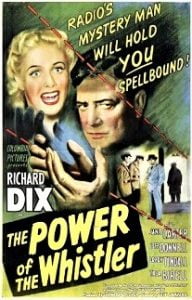
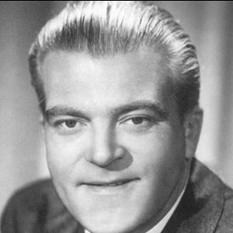 “I am the Whistler, and I know many things, for I walk by night. I know many strange tales, hidden in the hearts of men and women who have stepped into the shadows. Yes… I know the nameless terrors of which they dare not speak.”
“I am the Whistler, and I know many things, for I walk by night. I know many strange tales, hidden in the hearts of men and women who have stepped into the shadows. Yes… I know the nameless terrors of which they dare not speak.”
The Whistler (1942-55) aired “Black Magic” on September 18, 1944 as the 122nd of its 760+ episodes (depending on how one counts). It is only the fifth episode of the show we have run, three coming in 2017 and the fourth in September of 2019. For newcomers, introductory background material on the show is reprised below (it was the most popular west coast radio show for many years), with the background providing context for its not unique but unusual narrative format.
There were two attempts for The Whistler to break into the east coast market that didn’t last long (July-September 1946, and March 1947-September 1948) due to mediocre ratings, so if these episodes are counted as part of the overall scheme of things, the total number of shows ends up somewhere around 769. Over its thirteen-year west coast run it never took a summer break and ran continuously, certainly some kind of record, and its sole west coast sponsor, Signal Gas & Oil remained loyal throughout. While the show had several narrators over the years, the one who held the longest tenure and is most associated with the show was Bill Forman (photo top right).
The Whistler has an interesting backstory, and would take much too long to go into here to give it the justice it warrants. A few points of interest will suffice for this offering of the beloved mystery show, the first of which is the use of the narrator as more than just a host. From Jim Ramsburg’s Gold Time Radio entry on The Whistler: “Like The Shadow’s first personification a dozen years earlier, Inner Sanctum’s ghostly Raymond in 1941 and The Mysterious Traveler in 1943, The Whistler stood outside the stories he narrated. Unlike the others, he used a unique second-person, present tense technique as if to talk directly with the central character of his stories – often an innocent drawn into the plot by circumstances or an amateur driven to murder as a last resort.” A second point of interest has to do with the trademark whistling that opens each episode. From Radio Spirits‘ Blog Archive on The Whistler: “The program featured one of radio’s classic openings: a haunting 13-note theme created by Wilbur Hatch (who also composed the show’s eerie mood music). Hatch estimated that only one person in twenty could whistle this exact melody, and for the show’s thirteen-year duration one person pretty much did—a young woman named Dorothy Roberts. In fact, during the war years, Roberts had to get permission from Lockheed (where she worked) to leave her factory job in order to make it to the program and whistle every week.”
The radio show proved popular enough that Columbia Pictures made eight Whistler films from 1944-48, all but one starring Richard Dix: The Whistler (1944), The Mark of the Whistler (1944), The Power of the Whistler (1945), The Voice of the Whistler (1945), Mysterious Intruder (1946), The Secret of the Whistler (1946), The Thirteenth Hour (1947) and The Return of the Whistler (1948). The show was brought to early television in 1954-55, but never caught on. Nevertheless (and due in great measure to roughly 500 of the estimated 700+ original shows still surviving–and the movies still showing up on classic movie tv channels), The Whistler probably enjoys a larger audience today than it did in its heyday during the Golden Age of Radio.
“Black Magic” takes us into the darkest depths of Africa and a story befouled by greed, betrayal, and the placement of ones selfish desires above all else. Explosive ingredients on their own, but even more so when combined in such a roiling mixture as you will find here. In short, there are really no sympathetic characters or any with whom to empathize. The backdrop is a mining operation using natives as cheap labor but who have become ill and can no longer work, a husband who runs the mine and his wife trying to make the best of it when shortly the husband’s partner arrives and we learn he and the husband’s wife used to be a thing. Each scheme against the other allowing their emotions and evil plans to shape the tense narrative. And what of the poor natives you may ask? Could everything be resolved and comeuppance doled out by the ancient spells used to conjure “Black Magic?” Or are there some human beings who are just too mean, nasty, rotten and spiteful that nothing can overpower the blackness in their souls. Listen and perhaps discover what drives certain desperate people to act as they do, and whether these motives serve them well or ill.
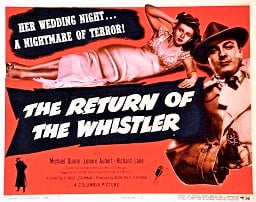
Play Time: 29:33
{Summer had just ended and the neighborhood gang had just returned to the classroom in September of 1944 but were still not ready to sit still all day listening to lectures. Rather, their heads were still in the pages of their newly purchased pulps where they learned of alien biology and the geology of other worlds. Astounding SF (1930-present, now Analog) was a monthly in 1944. Planet Stories and Startling Stories both ran from 1939-1955 and were quarterlies in 1944. Looking at the names on the individual covers of the issues below it is easy to see why these magazines were far more popular than any textbook: Clifford D. Simak, Henry Kuttner, and Leigh Brackett.}
[Left: Astounding, Sept. 1944 – Center: Planet Stories, Fall 1944 – Right: Startling Stories, Fall 1944]
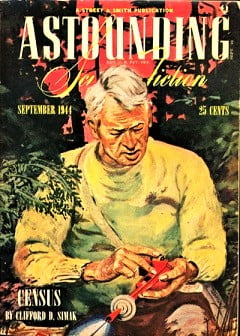
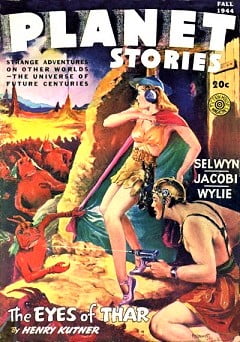
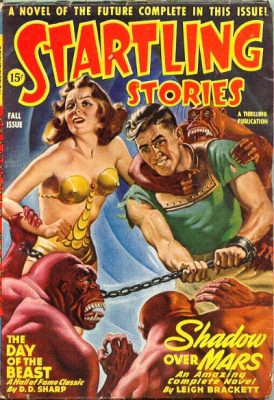
To view the entire list of Old Time Radio episodes go here.